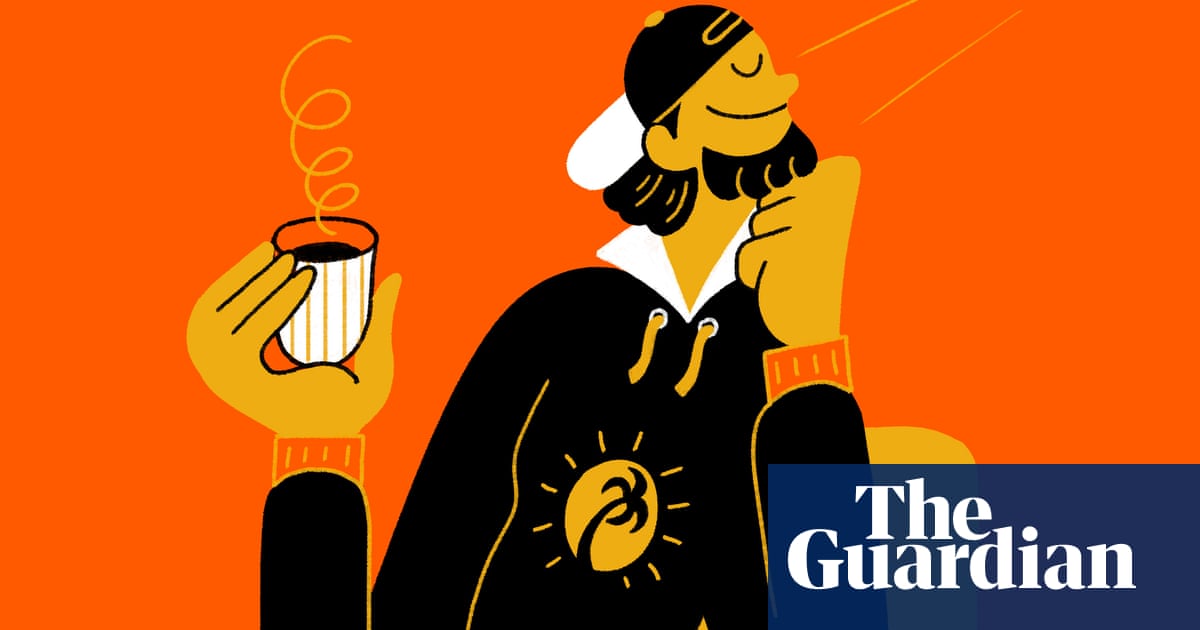
here was once a boy called Milo who didn’t know what to do with himself – not just sometimes but always.” So begins The Phantom Tollbooth, Norton Juster’s classic 1961 novel – and it’s all action from there. Milo is sent a “strange package” containing “One Genuine Turnpike Tollbooth” . He gets in his electric car, puts a coin in the booth and drives past it. He “suddenly” finds himself “speeding along an unfamiliar country road” in a new world where the colours are “richer and brighter than he could ever remember”, and the flowers shine “as if they’d been cleaned and polished”.
There are no whys or wherefores. Milo speeds from zero to incredible adventure in five short pages (including four beautiful line drawings by Jules Feiffer). Rereading this book during Covid-19 quarantine in the UK, I quickly remembered why I’d loved it so much as a child.
But some things did seem very different to my adult eyes. A few pages in, Milo finds himself in a place called the Doldrums, where the local inhabitants tell him about their daily routine:
At 8 o’clock we get up, and then we spend
From 8.00 to 9.00 daydreaming.
From 9.00 to 9.30 we take our mid-morning nap.
From 9.30 to 10.30 we dawdle and delay.
From 10.30 to 11.30 we take our late morning nap
From 11.30 to 12.00 we bide our time and then eat lunch.
And on goes the day until the final entry:
From 7.00 to 8.00 we take our early evening nap, and then for an hour before we go to bed at 9.00 we waste time.
How did they know about the lockdown?
But I couldn’t dwell on that for long, as Milo moves too quickly. In a few more pages, the no-longer-bored boy makes friends called the Humbug (because he’s a Humbug) and Tock (because he is a dog with a watch on his back – yes, a watchdog). Together, they race off through the various regions of the Lands Beyond – Expectations, Dictionopolis, the Valley of Sound – on a quest to rescue the princesses Rhyme and Reason from a Castle in the Air.
This is all as daft as it sounds, but far more entertaining. On the way they encounter the Half Bakery, which produces half-baked ideas: “They’re very tasty but they don’t always agree with you.” They have an encounter with the smallest giant in the world, the thinnest fat man and the fattest thin man. There are many more such puns and linguistic jokes. In the kingdom of Dictionopolis, Milo is offered the hospitality of their “kingdom”, “country”, “nation”, “state”, “commonwealth”, “realm”, “empire”, “palatinate”, “principality”. “Do all these words mean the same thing?” Milo asks. They reply: “Of course,” “Certainly,” “Precisely,” “Exactly,” “Yes.”
Plenty of the words Juster throws at us are ambitious for readers of any age. When The Phantom Tollbooth first came out, critics found it so challenging that some wondered if it was better suited to adults; as Library Journal wrote in January 1962: “The ironies, the subtle play on words will be completely lost on all but the most precocious children. Definitely for the sophisticated, special reader.”
The book can feel like a linguistic assault. It isn’t just that there are so many words, it’s that their meanings are scattered all over the place. My rereading as an adult left me tripping, puzzling and spinning. With so much else going on in the story, often with LOUD CAPITAL LETTERS, more than anything it reminded me of reading Ulysses (without the boring bits).
But while the book may be challenging for grownups like me, those early critics were wrong. The Phantom Tollbooth has been loved by millions of children around the world. I was one of them. I can’t honestly remember what I made of the big words. I’m guessing that I took pride when I understood their meaning, and when I didn’t, it wasn’t that different to the other weird and wonderful things going on. Juster once explained that: “As a kid I would say a word and repeat it and repeat it and repeat it until it had no meaning and was just a series of sounds. It seemed magical to me.”
It was that magic that grabbed me. I remember racing through the story with Milo: the big colours, the jokes, and the leaps of imagination. (Not to mention a fantastic riff about “jumping to Conclusions”, an island you can bounce to from the Lands Beyond.) I adored Milo’s spirit of rebellion, the absurdity, the cheek. And also the beauty. Here, for instance, is a description of “nourishing” sounds: “street noises at night, train whistles a long way off, dry leaves burning, busy department stores, crunching toast, creaking bedsprings, and, of course, all kinds of laughter”. I’m glad to say that I’m still not too old for that.












